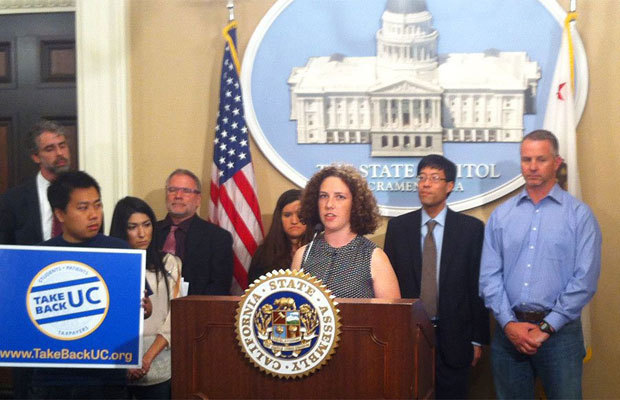‘Take Back UC’ aims to unify interests across state to change university

BY LIBBY RAINEY
UC activists from many different walks of life are finding a voice in a campaign with a set of goals as ambitious as its name: Take Back UC.
A coalition of students, workers, politicians and community members that has taken to the Internet to spread its cause, Take Back UC is purposely broad in scope — a movement meant to encompass any and all concerns about the health and prosperity of the university, according to supporters.
The campaign is the brainchild of the university’s largest union, American Federation of State, County and Municipal Employees Local 3299, a group representing more than 22,000 service and patient-care workers across the UC system’s 10 campuses, five medical centers and multiple clinics and laboratories. AFSCME 3299’s leadership decided to launch an online campaign to bring together various groups from the university and across California last summer, according to Todd Stenhouse, the union’s communications director. The movement quickly gained traction in the fall as groups such as Berkeley City Council and UC Berkeley’s ASUC Senate signed on in support.
“There’s clearly a lot of concern and a lot of evidence to suggest some real problems at UC,” Stenhouse said. “The idea was to construct a platform, literally an online platform, to connect people so they could effectively learn about some of the problems and become a part of a campaign to advocate for solutions.”
Among these problems are financial mismanagement, rising tuition for students and “deteriorating patient care” at the UC system’s medical facilities, according to the campaign’s website. Inspired by the public cohesion that surrounded Proposition 30, a California ballot initiative that increased taxes on the state’s wealthiest residents and saved the university from a massive midyear funding cut in November 2012, the union decided to launch a website and Facebook page for its cause.
Take Back UC has had an active Facebook presence since summer, but it officially launched in early November, when representatives gathered in Sacramento to announce the campaign. The coalition thus far has focused on rallying support — sharing articles and petitions online and sending representatives to speak at the UC Board of Regents meeting in November. But Stenhouse said AFSCME 3299 and others hope it will eventually serve as a sustained watchdog to hold the university accountable to its constituencies.
The movement has seen perhaps its biggest influx of support online, garnering nearly 9,000 likes on its official Facebook page. More than 6,500 people signed a group-sponsored online petition for fair pension reform.
The coalition’s claims about university mismanagement, however, are not uncontested. UC spokesperson Dianne Klein said many of the group’s assertions are unfounded or presented out of context, calling the movement an “extension” of ongoing labor negotiations between AFSCME 3299 and UC system. The university announced it would implement its last offer on wages and a revised pension plan to more than 8,000 service workers employed by the system and represented by the union in September after months of unsuccessful negotiations. The union also went on an all-day strike last month, claiming the university used intimidation tactics to prevent a strike in May.
“We have a new president, and good labor relations are paramount to her,” Klein said. “We are working to come to fair agreements with all of our unions. We are hopeful that we can get over this strife and come together for the good of the university.”
Still, those who have signed on with Take Back UC say it is about much more than one group or goal.
Berkeley City Council passed a bill in support of the grass-roots campaign in November, as did the ASUC Senate. Councilmember Kriss Worthington, who sponsored the City Council bill, said he first learned about Take Back UC on Facebook. Attracted to the movement’s far-reaching goals, he reached out to see how he could get involved.
“Having the workers understand what’s happening with the students and the students understanding what’s happening with the workers — that’s networking and having solidarity with each other,” Worthington said. “When I heard that people were trying to make a coalition and pull all these different groups together, that was extremely exciting to me.
State Sen. Anthony Cannella, R-Ceres, and Assemblymember Richard Pan, D-Sacramento, are two of the campaign’s highest-profile supporters, and both have pledged to push the coalition’s agenda in Sacramento. Cannella signed on due to his interest in pension reform and college affordability, according to Jeff Macedo, his communications director.
But the bulk of Take Back UC advocates come from outside the capital. Union groups representing UC postdoctoral researchers, academic student workers such as graduate student instructors and nonacademic senate faculty and librarians have pledged their support for the campaign. Julia Hallisy, president of advocacy group the Empowered Patient Coalition, also joined Take Back UC’s cause, hoping to address growing concerns about patient care at UC medical centers.
“I wasn’t surprised to see the Take Back UC movement — I was relieved to see it,” Hallisy said. “All these issues are related under the umbrella of the UC system.”
Hallisy spoke on behalf of the coalition at the UC Regents meeting’s public comment period in November. There are no formal discussions planned between the group and the regents, according to Klein.
Take Back UC supporters will move from discussion to action come spring, forming an action plan to tackle their disparate goals, according to Stenhouse. ASUC Senator Caitlin Quinn said she hopes to engage more students with the movement next semester.
“It just seemed like a really good starting place,” Quinn said. “Right now, my focus is what kind of action we can encourage students to take to get involved.”
[Source]: The Daily Californian


